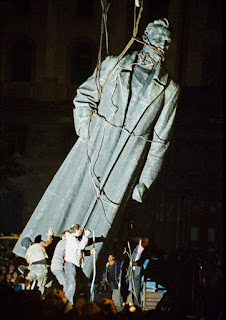Nazi Censorship and Condemnation of Degenerate Art
The Nazi regime condemned any work that did not align with
the Aryan ideas of the supreme race. Any work depicting a race other than
Aryan, any work reflecting emotions, suffering or any sign of vulnerability was
condemned as degenerate.[1] Modernist art was exactly
the “degenerate art” that was so hated by Hitler and the Nazi regime. Only
works that were strictly a reflection of realism and held to the classical
modes of painting and sculpture were considered “real art” to the regime, and
the early 19th century was anything but aligned with classical techniques.
The artists Ernst Ludwig Kirchner, Oskar Kokoschka and Paul Klee were all
modernist artists under the attack of the Nazis.[2] The Nazi’s forbade the exhibiting
of these and other artists’ work and confiscated and destroyed many works in
the modernist movement.[3]
The Degenerate Art
Exhibit was an attempt to show the populace that the modernist works
classified as degenerate were an obnoxious threat to the stability of Germany.
The Degenerate Art Exhibit consisted
of the “degenerate art” being hung in a manic order- crooked, cluttered- with
excerpts commenting on the works grotesqueness. The BBC news article provides
us with an excerpt from the exhibition handbook which explained the aim of the
show "[to] reveal the philosophical, political, racial and moral goals and
intentions behind this movement, and the driving forces of corruption which
follow them [regarding Modernist works of art]."[4] Following the Degenerate Art Exhibition was the Great German Art Exhibit which consisted
of “statuesque blonde nudes along with idealized soldiers and landscapes.”[5] Below is a painting by
Adolf Hitler which can serve as an example for what he and the Nazi’s
considered the supreme German art. The Great
German Art Exhibition was a representation of what the Nazis believed was
the pinnacle of great art and it was meant to counter the “grotesque” modern
images from the sister show.
After the "spectacle" of the degenerate art exhibition the work was either confiscated or destroyed to protect the German citizenry of the obscenity spreading.
Farmstead by Adolph Hitler
Photograph of the Degenerate
Art Exhibition
Max Beckmann's biblical and political triptych Departure (right) hangs on the same wall as Adolf
Ziegler's Four Elementstriptych, which Hitler
owned.
Courtesy of
Hulya Kolabas for Neue Galerie New York
The above photograph compares the
art shown at each exhibition, the right being “degenerate art” and the left
being the “great German art”.
Works Cited
Schwartz, Lloyd. “'Degenerate' Exhibit Recalls Nazi War On
Modern Art.” NPR, NPR, 29 May 2014,
www.npr.org/2014/05/29/317034126/degenerate-exhibit-recalls-nazi-war-on-modern-art.
Burns, Lucy. “Degenerate Art: Why Hitler Hated
Modernism.” BBC News, BBC, 6 Nov. 2013,
www.bbc.com/news/magazine-24819441.
by Lexie Blevins
[1]
Schwartz, Lloyd. “'Degenerate' Exhibit Recalls Nazi War On Modern Art.”
NPR
[2]
Schwartz, Lloyd. “'Degenerate' Exhibit Recalls Nazi War On Modern Art.”
[3]
Schwartz, Lloyd. “'Degenerate' Exhibit Recalls Nazi War On Modern Art.”
[4]
Burns, Lucy. “Degenerate Art: Why Hitler Hated Modernism.” BBC
[5]
Burns, Lucy. “Degenerate Art: Why Hitler Hated Modernism.”





Comments
Post a Comment